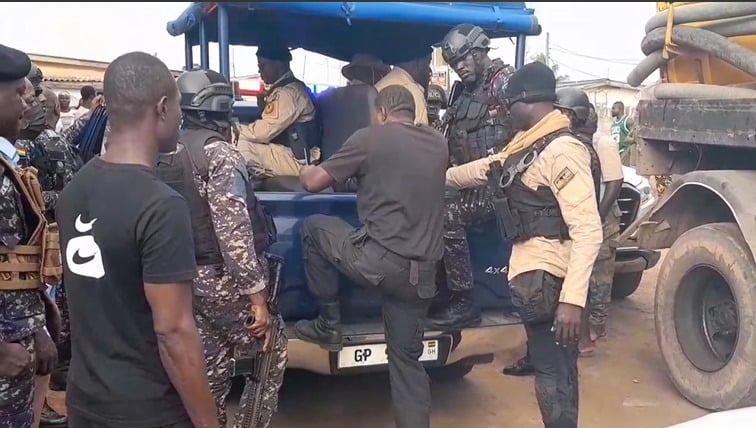The incident at the Awoshie DVLA polling station during the Ablekuma North Constituency parliamentary re-run election highlights the vulnerability of electoral processes to impersonation and potential disruption. A group of individuals, dressed in brown uniforms suggestive of security personnel, were apprehended by legitimate security forces deployed to the polling station. Their suspicious loitering near the entrance of the polling centre, coupled with their inability to produce any valid identification when questioned, immediately raised red flags. The swift action taken by the authorities prevented any potential interference with the electoral process, underscoring the importance of vigilance and proactive security measures during elections. The incident underscores the need for continued vigilance and robust security protocols at polling stations to maintain the integrity of the electoral process.
The apprehension of these individuals, whose true motives remain under investigation, raises several critical questions about electoral security. Were they attempting to intimidate voters? Were they planning to disrupt the voting process? Or were they seeking to influence the outcome of the election in some other illicit manner? The fact that they were impersonating security personnel adds another layer of complexity to the situation. Such impersonation not only undermines the authority of legitimate security forces but also erodes public trust in the electoral process. It creates an atmosphere of uncertainty and fear, which can deter voters from exercising their democratic rights.
The Municipal Chief Executive (MCE) for Ga West and Dean of MMDCEs in the Greater Accra Region, John Desmond Nii Sowah Nai, confirmed the incident and stated that preliminary investigations suggest the individuals are not affiliated with any official state security institution. This statement reinforces the seriousness of the impersonation and highlights the potential for unauthorized individuals to exploit vulnerabilities in security protocols. The ongoing police investigation is crucial for uncovering the true identities of the suspects, their motivations, and any potential connections they may have to political actors or other groups.
The incident serves as a stark reminder of the ongoing challenges faced by electoral commissions and security agencies in ensuring free, fair, and transparent elections. Impersonation of security personnel is a tactic that can be used to intimidate voters, disrupt polling procedures, and undermine the legitimacy of the electoral process. It is essential that security agencies are equipped with the resources and training necessary to identify and apprehend individuals engaging in such activities. Furthermore, measures must be implemented to strengthen voter identification procedures and enhance security protocols at polling stations to prevent unauthorized access and maintain a secure environment for voters and election officials.
Beyond the immediate security concerns, this incident also raises broader questions about the political climate and the potential for electoral manipulation. In a highly contested election, the temptation to employ illicit tactics to gain an advantage can be significant. Impersonating security personnel is just one example of the many ways in which the integrity of an election can be compromised. It is therefore imperative that political parties, civil society organizations, and the media play an active role in promoting peaceful and transparent elections and in holding those who engage in electoral malpractice accountable.
Moving forward, it is crucial that the Ghanaian authorities conduct a thorough investigation into this incident and bring those responsible to justice. The investigation should not only focus on identifying the individuals involved but also on determining whether they were part of a larger network or operating under the direction of others. The findings of the investigation should be made public to ensure transparency and accountability. Furthermore, the incident should serve as a catalyst for a review of electoral security procedures and the implementation of measures to prevent similar incidents from occurring in the future. This includes strengthening voter identification protocols, enhancing security training for polling station officials, and increasing the presence of legitimate security personnel at polling locations. Ultimately, safeguarding the integrity of the electoral process is essential for upholding democratic principles and ensuring the will of the people is respected.














